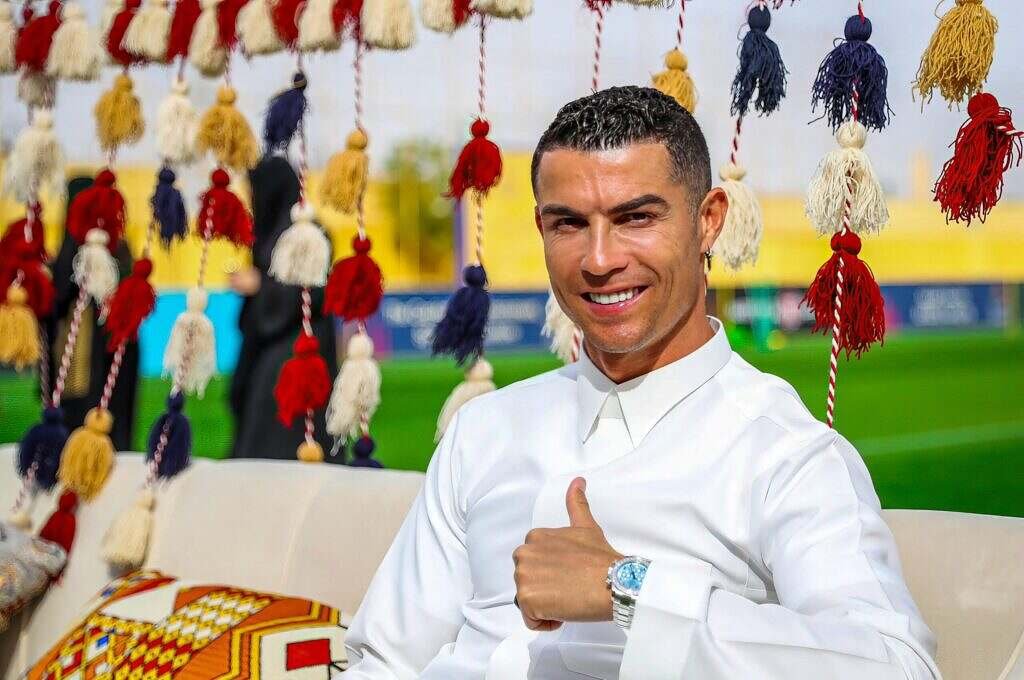
Cristiano Ronaldo is widely recognized as one of the greatest football players of all time. With a career spanning over two decades, the Portuguese forward has achieved numerous accolades, including five Ballon d’Or awards, multiple UEFA Champions League titles, and a plethora of national and club records. He is renowned not only for his athletic prowess but also for his philanthropic efforts and charismatic personality. As a global icon, Ronaldo’s influence extends beyond the football pitch, affecting various cultural and social spheres around the world.
Recently, Cristiano Ronaldo’s expressed interest in Islam has garnered significant media attention, spurring discussions among fans and analysts alike. Reports have emerged suggesting that the player, currently contracted to Al-Nassr in Saudi Arabia, is considering conversion to the Islamic faith. This development is particularly noteworthy, as Ronaldo’s presence in the Middle East not only elevates his own status but also illuminates the vibrant culture and lifestyle of the region.
The context surrounding Ronaldo’s potential conversion draws attention to both the personal and societal implications, as religion plays a vital role in shaping identities and communities. The discussions surrounding such matters can offer insights into how figures like Ronaldo navigate their personal beliefs amidst the pressures and expectations of their public personas. Moreover, this situation may also highlight the evolving landscape of football, particularly as the sport continues to develop in the Middle East, where interest in the sport is on the rise.
Ultimately, exploring Cristiano Ronaldo’s interest in Islam provides a unique perspective into the intersections of sports, culture, and faith, prompting further discussion among fans and scholars about the broader implications of such a significant personal journey.
Who is Cristiano Ronaldo?
Cristiano Ronaldo dos Santos Aveiro, commonly known as Cristiano Ronaldo, is a Portuguese professional footballer born on February 5, 1985, in Funchal, Madeira. Renowned as one of the greatest football players in history, Ronaldo’s career has been marked by extraordinary achievements, including multiple UEFA Champions League titles, national league victories across England, Spain, and Italy, as well as numerous personal accolades such as five Ballon d’Or awards. His phenomenal goal-scoring ability has helped him become the all-time top scorer for both his clubs and the Portuguese national team.
Ronaldo began his professional career with Sporting Lisbon before moving to Manchester United in 2003, where he quickly garnered attention for his remarkable skill and athleticism. His time at Manchester United included winning three Premier League titles and a Champions League trophy, establishing him as a household name. In 2009, he transferred to Real Madrid for what was then a world-record fee. During his tenure with the Spanish club, Ronaldo achieved unprecedented success, leading them to four Champions League victories and cementing his legacy in football history.
In 2018, Ronaldo moved to Juventus, where he continued to excel before returning to Manchester United in 2021. As of 2023, he plays for Al-Nassr in Saudi Arabia, where he not only seeks to enhance his legacy but also to promote the growth of football in the region. Beyond his career achievements, Ronaldo’s personal life, including his philanthropic efforts and dedication to family, reflects a multifaceted individual admired by millions. Given his influence, Ronaldo’s beliefs, values, and personal choices resonate with fans, further amplifying discussions surrounding notable topics such as his recent interest in Islam.
The Role of Belief in Professional Sports
In the realm of professional sports, personal beliefs and spirituality often play a pivotal role. Many athletes draw strength from their faith, which can serve as a source of inspiration and resilience in the face of adversity. The psychological benefits of having a strong belief system are well-documented, with numerous studies suggesting that spirituality can enhance focus, improve mental health, and boost overall performance during competition. For athletes who may experience the pressures of public scrutiny, maintaining a belief in something greater than themselves can provide a sense of comfort and security.
Belief systems can also influence athletes’ work ethics and discipline, further contributing to their success. When faced with challenging circumstances, a robust spiritual foundation can motivate athletes to persevere and strive for excellence. It also fosters a sense of community and belonging, as many sports figures often engage with followers who share similar beliefs. This engagement can enhance their public persona, solidifying their status both on and off the field.
Moreover, the intersection of personal beliefs and athletic performance can lead to intriguing narratives that captivate the public. Stories of athletes who openly embrace their faith can inspire countless fans, making their journeys more relatable. As such, spirituality becomes not only a personal experience but also a public narrative that garners attention and discussion. This dynamic is particularly evident in the case of high-profile athletes like Cristiano Ronaldo, whose interest in Islam has sparked conversations about the role of faith in the lives of professional athletes.
Ultimately, the relationship between belief and sports is multifaceted. Athletes often navigate the spectrum of faith, personal values, and professional commitments. The interplay of these elements can significantly impact their performance and public image, providing a deeper understanding of who they are beyond their physical capabilities.
Former Al-Nassr Goalkeeper’s Claims
Recent statements made by a former goalkeeper of Al-Nassr shed light on Cristiano Ronaldo’s potential interest in Islam, a topic that has garnered attention among fans and the media alike. The goalkeeper, whose tenure at the club coincided with Ronaldo’s recent transfer, spoke about personal conversations he had with the football superstar. According to his claims, Ronaldo expressed curiosity about various aspects of Islamic culture and practices.
In an interview, the former goalkeeper stated, “During our time together at Al-Nassr, Ronaldo often asked questions about the values and teachings of Islam. He was particularly intrigued by the discipline and sense of community that comes with the faith.” This observation emphasizes Ronaldo’s openness to learning about different cultures, suggesting a respectful curiosity that may go beyond mere superficial interest.
The goalkeeper further illustrated this point by sharing an anecdote involving a mosque visit. He recounted, “One day, after training, Ronaldo requested to accompany me to a local mosque. He wanted to experience it firsthand, to understand the atmosphere and the significance it holds for many people.” Such actions indicate a level of engagement that supports the notion of a genuine interest rather than a fleeting moment of curiosity.
Additionally, the goalkeeper noted that Ronaldo has shown respect for the Muslim players in the team, often acknowledging their customs during Ramadan. “He made it a point to accommodate our schedules,” the goalkeeper said. This behavior reflects a commendable level of sensitivity and understanding toward his teammates’ beliefs, showcasing an admirable quality in a global sports icon.
Overall, these insights from a firsthand source provide a compelling narrative regarding Cristiano Ronaldo’s exploration of Islam, highlighting an admirable curiosity towards understanding diverse cultures and practices.
Cristiano Ronaldo’s Personal Interests and Values
Cristiano Ronaldo, widely known as one of the greatest football players of all time, embodies a blend of personal interests and values that resonate deeply with his fans and followers globally. Beyond the football pitch, Ronaldo’s approach to life is characterized by determination, discipline, and a commitment to philanthropy, which significantly aligns with several principles found within Islamic teachings. His dedication to excellence in sport demonstrates values such as hard work and perseverance, integral aspects of both his personal philosophy and Islamic principles.
Ronaldo is also recognized for his extensive charitable endeavors. He has supported numerous causes, including children’s hospitals, cancer research, and disaster relief efforts. This commitment to helping those in need is a reflection of the Islamic value of charity, or “Zakat,” which emphasizes the importance of supporting the less fortunate. By aligning his personal passions with philanthropic initiatives, Ronaldo illustrates a compassionate worldview, mirroring the altruistic practices found within the Islamic faith.
Additionally, his family plays a central role in his life, highlighting another fundamental value cherished in Islam—the significance of family and community. Ronaldo prioritizes spending quality time with his children and focuses on instilling positive values in them, underscoring his belief in nurturing strong familial bonds. His presence at significant family events and gatherings showcases a value system that emphasizes togetherness, loyalty, and respect, which are core tenets of Islamic family life.
Furthermore, Ronaldo’s interest in fitness and wellness can be viewed through a lens of discipline and respect for the body, which aligns with the Islamic teaching of maintaining one’s health. Such values underscore the importance of living a balanced life, where physical, mental, and spiritual well-being is prioritized. By embracing these personal interests and values, Cristiano Ronaldo presents a persona that resonates profoundly with principles found within Islamic teachings.
Reactions from Fans and the Media
The news of Cristiano Ronaldo’s potential conversion to Islam has generated significant reactions from both fans and media outlets across the globe. As one of the most recognized athletes, any personal decision involving Ronaldo tends to attract intense scrutiny and diverse perspectives. Supporters of Ronaldo have expressed a range of emotions, often rooted in admiration and respect for his right to choose his spiritual path. Many fans view this potential transition positively, seeing it as an indication of growth and exploration in his life beyond the football pitch.
Conversely, some segments of the media have approached the subject with a more analytical lens, delving into the broader implications of a sports icon embracing a new faith. Articles and commentaries have examined how such a decision could influence Ronaldo’s public image and relationship with his fans, particularly in regions where Islamic communities are prominent. There is curiosity regarding how this potential conversion might affect his brand and endorsements, given that he represents numerous global companies and serves as an ambassador for multiple causes.
Additionally, social media platforms have been abuzz with varying opinions, illustrating the stark divisions among supporters. While some express blind loyalty, others engage in spirited debates about cultural sensitivity and the role of sports figures in advocating for faith. This discussion also overlaps with the public’s awareness of Islam, showcasing both positive curiosity and skepticism about the religion and its values. Overall, the reaction represents a microcosm of how personal decisions by globally influential figures can spark widespread dialogue, reflecting the intersections of religion, culture, and fandom in contemporary society.
Historical Conversions of Other Athletes
The phenomenon of athletes converting to Islam has been a notable aspect of the sports community, illustrating personal transformations that often resonate beyond their professional lives. Prominent figures such as Muhammad Ali, who converted in the 1960s, epitomize how faith can play a crucial role in shaping identity and public perception. Ali’s conversion had a profound impact on his boxing career, as he utilized his platform to advocate for civil rights, intertwining his religious beliefs with activism.
Similarly, former NFL player Hakeem Olajuwon embraced Islam during his basketball career, which influenced not only his gameplay but also his philanthropic efforts. Olajuwon often spoke about how his faith guided him in overcoming personal and professional challenges, while also fostering a sense of community among his peers. Both athletes found that their spiritual journeys offered them a deeper sense of purpose, which further enriched their engagement with fans and broader society.
Other sports figures, such as NBA star Kareem Abdul-Jabbar and the late soccer player George Weah, also transitioned to Islam, enhancing their visibility within their respective sports. Abdul-Jabbar used his platform to address issues related to race and inequality, drawing on his belief system to inspire social change. Meanwhile, Weah’s conversion provided him the impetus to pursue a political career after his time in football, demonstrating how such life-altering choices can pave new paths for athletes.
These examples underscore the broader implications of faith in sports, highlighting how conversions can influence not only the athletes’ careers but also their dedication to societal causes. Considering the interest surrounding Cristiano Ronaldo’s possible conversion to Islam, it becomes evident that this narrative is part of a larger context where spirituality and sports intersect, potentially reshaping both the individual’s public image and impact.
Potential Impact on Ronaldo’s Career and Legacy
The potential impact of Cristiano Ronaldo’s interest in Islam on his career and legacy is a multifaceted topic that invites reflection from various perspectives within the football community. As one of the most recognizable figures in sports, Ronaldo’s actions resonate widely, and any significant personal transformation, such as converting to Islam, would undoubtedly attract considerable media attention and fan scrutiny.
On one hand, embracing a new faith could enhance Ronaldo’s profile among Muslim fans, further solidifying his already substantial fan base in regions where Islam is predominant. Through this engagement, he may foster a deeper connection with millions of supporters, drawing them closer to his journey both on and off the pitch. Established players often leverage personal milestones to create an inspirational narrative, transitioning their legacies into symbols of passion and unity. Therefore, this newfound spiritual dimension could transform how fans perceive him, elevating his status to that of not only a football icon but also a role model who exemplifies diversity and acceptance.
However, the conversion may also yield mixed reactions. Some segments of the football community might interpret this change as a departure from his previously secular public persona, which could alienate certain fans. Furthermore, media scrutiny could amplify existing narratives surrounding his character, potentially affecting commercial endorsements and partnerships. Companies often prioritize aligning their brand with figures whose public image resonates positively with their target audience. As such, there is a valid concern that a prominent shift in belief systems could lead to controversies that influence his marketability.
In conclusion, Cristiano Ronaldo’s interest in Islam could profoundly impact his career and legacy, offering both opportunities for deeper connections with a broader fan base and risks of mixed reactions from various stakeholders in the sports world. The true extent of these effects would be determined by how he navigates this personal journey amidst public expectations.
Conclusion: A Personal Journey
Throughout this exploration of Cristiano Ronaldo’s interest in Islam, we have examined the multifaceted nature of faith, identity, and personal interpretation within the realm of professional sports. The insights provided by former Al-Nassr goalkeeper, who has witnessed Ronaldo’s influence firsthand, shed light on the complexities surrounding athletes and their beliefs. As a global icon, Ronaldo’s potential interest in Islam invites a broader conversation about how public figures navigate spirituality in the spotlight of fame and scrutiny.
Conversion to any faith is inherently a personal journey, characterized by introspection and individual conviction. Athletes like Ronaldo often face unique pressures as they balance public expectations with their evolving sense of self. Their decisions regarding religion are rarely black and white; rather, they reflect a dynamic interplay of culture, personal experiences, and emotional connections. This nuanced perspective encourages us to approach conversations about faith with an open mind, understanding that discussions about conversion transcend mere curiosity and tap into deeper philosophies of life and belonging.
Moreover, the influence of sports figures extends beyond the pitch, impacting millions of fans worldwide. If Ronaldo chooses to explore or embrace Islam, it could serve as a powerful example of inclusivity and acceptance, encouraging dialogue and understanding among diverse communities. Such developments can foster respect for different beliefs, resonating with individuals who may feel marginalized or misunderstood due to their faith.
In light of these reflections, it is imperative to consider that every spiritual path is laden with significance and demands respect. Whether Ronaldo continues on this newfound trajectory of faith or remains firmly rooted in his current beliefs, his journey serves as a poignant reminder of the intricate relationship between identity, belief, and the very essence of humanity.



